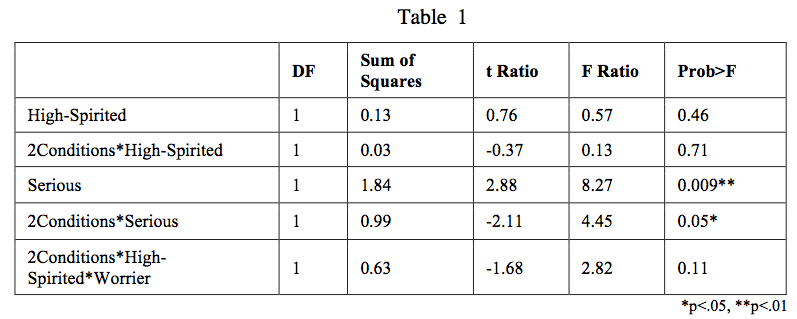Media Effects Research Lab - Research Archive
What works better: humorous vs. non-humorous television programs for effective promotion
Student Researcher(s)
Ashley Han (Ph.D Candidate);
Elise Stevens (Masters Candidate);
Faculty Supervisor
INTRODUCTION
Today, viewers are tuning in to late-night comedy programs to watch interviews of celebrities. Various studies have shown that humor can enhance a consumer’s attitude toward a brand, attention and recall, credibility of the source, evaluation, and purchase intention for the product (Cho, 1995; Alden, Mukherjee, & Hoyer, 2000). Research has also shown that comedy has been a beneficial way to sell products, however, we do not know if it is as effective for celebrity promotion. This study explores whether humor is a factor that could influence audiences’ perceived credibility, attitude towards the interviewee, and purchase intention.
RESEARCH QUESTION(S) AND HYPOTHESES:
RQ1: For college students, controlling for demographics, what is the relationship between attitude toward the show and the perceived credibility of the interviewee?
RQ2: For college students, controlling for demographics, what is the relationship between attitude toward the show and attitude toward the interviewee?
RQ3: For college students, controlling for demographics, what is the relationship between attitude towards the show and purchase intention of the product?
RQ4: For college students, controlling for demographics, what is the relationship between personality, type of show, and perceived credibility?
RQ5: For college students, controlling for demographics what is the relationship between personality, type of show, and attitudes towards the interviewee?
RQ6: For college students, controlling for demographics what is the relationship between personality, type of show, and purchase intention of the product?
H1: People will have a more positive attitude toward the humorous show than the non-humorous show.
H2: People will perceive higher credibility towards celebrities on a humorous show than a non-humorous show.
H3: People will have a more positive attitude towards the celebrity on the humorous show than the non-humorous show.
H4: People will have a higher purchase intention for the product promoted in the humorous show than in the non-humorous show.
METHOD
A two-condition, between-groups online experiment was conducted. All participants (N = 37) were invited to participate in one of the two experimental sessions: one with a humorous television show and the other with a non-humorous television show, depending on the condition to which they were randomly assigned to at the experimental sessions. Linear regression, one-way ANOVA and factorial ANOVA were performed to answer the research questions and test research hypothesis.
RESULTS
The results of factorial ANOVA showed that there was a statistically significant relationship between a serious personality and perceived credibility towards the interviewee, F (1, 21) = 8.27, p< .05. Moreover, the interaction between a more serious personality and type of the show was shown to have a significant relationship on perceived credibility towards the interviewee, F (1, 21) = 4.45, p< .05, as indicated in Table 1.

The results also showed a statistically significant relationship between a more serious personality and attitude towards the interviewee, F (1, 21) = 10.44, p< .05. The main effect of a more serious personality was shown statistically significant with purchase intention, F (1, 21) = 5.61, p< .05. The results of one-way ANOVA showed the relationship between the type of show and attitude towards the show was statistically significant, F (1, 35) = 59.12, p< .001, indicating that participants have more positive attitude towards humorous shows than non-humorous show. Thus, H1 was supported. However, no significant relationship was shown between the type of show and perceived credibility, attitude towards the interviewee, and purchase intention of the product. Thus, H2, H3, and H4 were not supported.
CONCLUSIONS
The most significant inference from the current study is that humor plays an important part in influencing viewers’ attitude toward the show. When disregarding the content of the show, humorous shows seem to generate more positive attitude among audiences than non-humorous shows. In addition, personality as a moderator also affects people’s perceptions of the interviewee, in terms of perceived credibility, attitude towards the interviewee, and purchase intention of the product promoted in the television show.
For more details regarding the study contact
Dr. S. Shyam Sundar by e-mail at sss12@psu.edu or by telephone at (814) 865-2173

